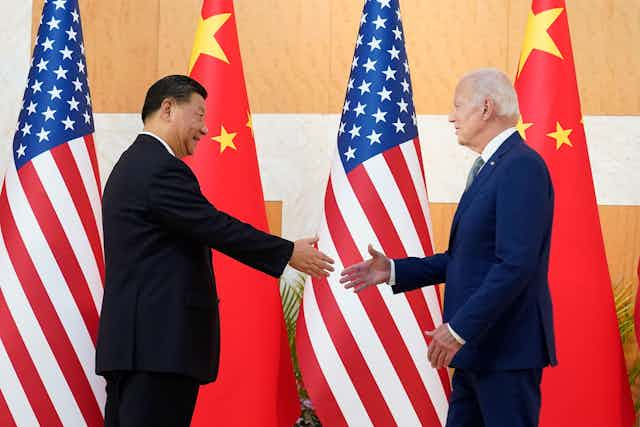US president, Joe Biden, is expected to meet China’s leader, Xi Jinping, in San Francisco as part of the Asia-Pacific Economic Cooperation (Apec) conference on Wednesday November 15.
Their meeting has great significance, as the two leaders have not met since the G20 in 2022, and because of their lack of agreement concerning current global conflicts, particularly the Ukraine war.
Biden’s relationship with Xi is already strained. At the G20 meeting, Biden spoke with Xi about China’s position on Taiwan (the US is worried about China military action towards the self-governing island), the Russian invasion of Ukraine (the US would like China to put pressure on Russia to bring an end to the conflict), and the US-China trade relationship (which has been extremely rocky). These issues are all expected to be on the agenda.
While the US-China relationship is unlikely to be the deciding factor in 2024’s US presidential election, it could feature. Around 83% of Americans have a negative view of China, with people concerned about China’s role in the world and the fate of Taiwan, according to Pew Research. But Chinese attitudes to the US might be mellowing. According to a poll conducted in October, fewer Chinese (48%) think of the US as an enemy than in 2022 (74%).
What Biden needs
Biden is unlikely to significantly change his current position on China, one that aims to curb China’s economic growth and limit its diplomatic influence while maintaining US geopolitical dominance. But the Atlantic Council think-tank suggests that maintaining open dialogue with China will gain Biden support from the US public. Only 13% of Americans want a confrontational approach to China, a recent poll suggests.
Biden needs a bump in the polls. Latest surveys on the upcoming presidential election put Biden slightly behind Trump, despite record job creation and 3.7% inflation nearing US Federal Reserve’s target level of 2%. The uncertainty about who might be in the White House in 2025 will influence Chinese expectations of the meeting. It’s likely that China will not commit to any long-term agreements until after the 2024 election.
Read more: Xi-Putin meeting: here's what it says about their current, and future, relationship
Some commentators expect that resumption of high-level military dialogue between the two nations will be a major topic for both leaders. Such dialogue potentially helps to divert a military crisis, especially in contested regions such as the South China Sea and Taiwan Strait where China claims sovereignty. The Biden administration wants to see greater stability in the US-China relationship and to ensure there is no military misunderstanding between the two countries.

In the Washington Post, political correspondent Olivier Knox speculates that discussions around AI will be on the agenda. The US secretary of state, Antony Blinken, believes that AI should not be involved in the decision-making processes concerning the use of nuclear weapons. Earlier in November, China signed a declaration at the AI Safety Summit, hosted by the UK at Bletchley Park, signalling a commitment to an international approach to AI and its use.
Some sources have suggested that US authorities are hoping to discuss the possibility that China will restrict the supply of chemicals used to make fentanyl. Deaths involving the drug, a synthetic opioid more powerful than heroin, were more than 100,000 in the US in 2021, according to a recent report from the University of California, Los Angeles.
Neither the White House nor Beijing have outlined their expectations of the meeting, but that’s probably deliberate. Jude Blanchette, chair of China Studies at the Center for Strategic and International Studies in Washington, said the objective of the meeting was to act as catalyst for further negotiations.
There has been a flurry of meetings between Chinese and US officials in the lead up to the Apec summit. Janet Yellen, the US treasury secretary, was due to meet the Chinese vice premier, He Lifeng, ahead of the Biden-Xi meeting.
China is also looking for solutions to its economic crisis, and this may open up some space for negotiation. China’s economy is facing many challenges and has not returned to pre-COVID growth levels. China’s foreign trade is in decline and it will seek to discuss improving its trade relationship with the US.
The Trump factor
With an election in 12 months’ time, Biden cannot be seen to be weak towards China. His likely Republican opponent, former president Donald Trump, has continuously adopted a belligerent attitude towards China’s economic challenge to the US, introducing a number of tariffs on Chinese imports after 2018.
In January 2020, Trump signed what he called an “historic trade deal” with China that committed China to buying US$200 billion (£163 billion) of US exports before the end of 2021. But China did not keep their end of the bargain, with one report stating that China only bought 58% of the agreed amount, less than it had before the agreement.
Republicans on the House select committee on China have written to Biden and demanded that he takes a more assertive position to “to defend American interests and values”. The letter also calls on Biden to demand Xi releases Hong Kong pro-democracy campaigner Jimmy Lai and others held by China authorities.
There are suggestions that the possibility of Trump returning to the White House is making diplomats around the globe reluctant to commit to long-term partnerships with the US. Trump has promised to “tax China to build up America”. This would resume the trade war that resulted in the Trump administration placing tariffs on Chinese exports to the US.
This meeting could cap tension levels and offer some stability for further negotiations. For Biden, it’s a domestic minefield. If he is too “hard” in his positioning, he risks alienating the electorate, while if he is too soft, he will attract criticism from Republicans. If Biden can walk this tightrope successfully, he may be able to use it during next year’s election cycle, showing he’s the right person to lead the United States.

